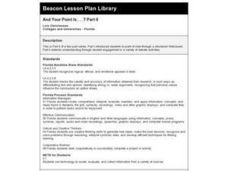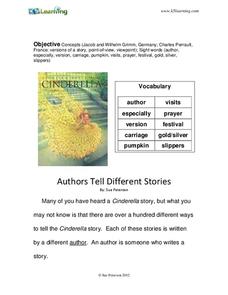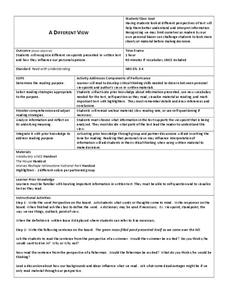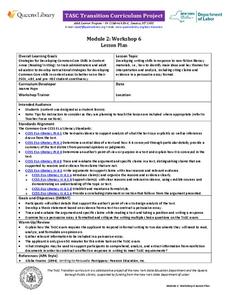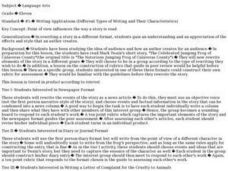Idaho State Department of Education
Lessons for Social Studies Educators
Point of view, purpose, and tone: three concepts readers of primary and secondary source materials must take into account when examining documents. Class members view a PowerPoint presentation and use the SOAPS strategy to identify an...
ReadWriteThink
Teaching Point of View With Two Bad Ants
What better way to explain the concept of point of view than from an ant's perspective! After reading Two Bad Ants, pupils identify the point of view of the ants by studying the text and pictures. Then, they fill out a...
Curated OER
Author's Purpose
Sixth graders brainstorm the reasons authors write, and they list their responses on the board. Students discuss each purpose they have listed.Students work independently to read the selection "Tarantulas and Typhoid" by...
Curated OER
And Your Point Is . . .? Part II
After researching recent community or political issues, paired with a review of proper debate format, class members select a topic, adopt a side, and prepare for a debate. The value in this resource is the review of debate procedures,...
English Linx
Points of View Worksheet
Put your learners' skills in identifying point of view to the test (or just practice) with an activity that has them identify the point of view in a story by giving three textual examples. The directions are clear and examples of first...
Curated OER
Evaluating Information Quality
Students evaluate information they are given and identify the quality of the information as fact, fiction, and point of view. In this information quality lesson plan, students also discuss how they can pick out good information verses...
K5 Learning
Authors Tell Different Stories
The story of Cinderella is a popular one! So much so, there are multiple versions of the story being told around the world. With this collection of activities your young readers receive background information about two versions...
EngageNY
Mid-Unit Assessment: Analyzing Author’s Purpose in Speech and Text
Part one of a mid-unit assessment relating to The Omnivore’s Dilemma includes listening to and analyzing a speech by Birke Baehr. Part two involves analyzing an excerpt from the text. The assessment ends with short response questions.
Curated OER
A Different View
Readers need to understand how their personal view point may differ or change how they see the view point found in a written text. Third graders read two informational pieces and fill out a graphic organizer to help them differentiate...
Syracuse City School District
Literary Elements
Address the literary elements in a piece of writing using these materials. The packet includes plenty of resources, and focuses mainly on theme, character, and point of view, with some materials for setting, symbolism, and author's...
Prestwick House
The House on Mango Street Activity Pack
Enrich a unit on The House on Mango Street by Sandra Cisneros with a selection of related activities. The packet contains nine activities that go from pre-reading through wrapping up the novel. Young readers work on studying...
EdHelper
George Washington's Socks by Elvira Woodruff
A solid, straightforward book report form is an excellent addition to your literature unit. Class members note the main characters, point of view, plot elements, and other important details from a story, adding their favorite part...
Mr. Mansour
Ralph S. Mouse by Beverly Cleary
Take an in-depth look into Beverly Cleary's story, Ralph S. Mouse, with a 10-question worksheet that focuses on story elements. Scholars describe the main character, point of view, conflict resolution, and more! Then, conclude with...
EngageNY
TASC Transition Curriculum: Workshop 12
How can opinions slant facts? Workshop participants learn how to examine primary and secondary sources and identify the author's point of view. They also examine how visual art impacts the meaning and rhetoric of sources. Full of...
Curated OER
8th Grade Reading Comprehension Success
Augment your eighth grade language arts curriculum with a thorough set of reading comprehension activities and assessments. Focusing on a variety of skills, including vocabulary in context, text structure, main idea, and author's style,...
EngageNY
TASC Transition Curriculum: Workshop 6
Is a college education necessary for success in today's world? The class investigates the question, along with others at the end of the sixth workshop in a 15-part series. The instructional activity has four parts with multiple...
Nancy N. Boyles
Summary Frame for Story Text and Informational Text
Provide these templates as aids for pupils as they work to compose summaries of both stories and informational texts. The first two frames provide sentence starters to help learners structure their summaries and include all the necessary...
Fluence Learning
Writing About Informational Text: Beyond the Beyond—Galaxies
Everyone has a different point of view, even when it comes to the enormity of the universe. Two separate text passages explain the scope of a galaxy, prompting young readers to write an essay about each author's argument and how the...
University of Pennsylvania
Decoding Propaganda: J’Accuse…! vs. J’Accuse…!
Reading snail mail is a great way to go back into history and to understand others' points of view. The resource, the second in a five-part unit, covers the Dreyfus Affair. Scholars, working in two different groups, read one letter and...
Center for History Education
How Did the Public View Women’s Contributions to the Revolutionary War Effort?
Calling upon the legacies of Joan of Arc, Elizabeth I, and Catherine the Great, Esther Reed rallied Southern women to support the American Revolution. Using a broadside by Reed and other primary sources, such as poetry, young historians...
Curated OER
Writing Applications: Different Types of Writing and Their Characteristics
Twelfth graders rewrite a story in a different format to understand the effects of the author's style. In this writing style instructional activity, 12th graders read Mark Twain's "The Celebrated Jumping Frog of Calaveras County" and...
Los Angeles Unified School District
Capitalism and Socialism
Capitalism, socialism, communism ... these may seem like a whole bunch of isms to your scholars. High schoolers won't confuse them after completing an informative resource. Your class masters how to use primary sources to...
Curated OER
Girders and Wrecking Ball Activity
As learners build the "girders" of conversation by staying consistent on a particular topic, they avoid the "wrecking ball" of an off-topic comment. To help students develop this important conversation skill, this resource provides...
Curated OER
What is Theme?
What is theme, and how can you find themes in literary works? These and other questions are answered by a colorful and engaging presentation that not only defines the term but also provides easy to understand examples. The slides...
Other popular searches
- Authors Point of View
- Author's Point of View
- Author's Point of View Media
- Authors Point of View Media
- Author's "Point of View" Media



